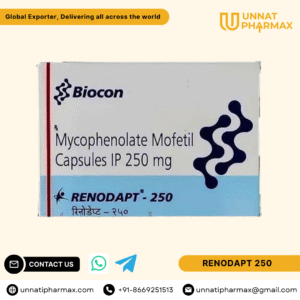Product introduction
Renodapt 250 Capsule belongs to a group of medicines called immunosuppressants. It is used with other medicines to prevent your body from rejecting an organ (such as a kidney, heart, or liver) after a transplant. It works by suppressing your body’s immune system so that it does not attack the new organ.
The amount of Renodapt 250 Capsule you take and how often you take it depends on the type of transplant you have. Follow your doctor’s instructions on this. Take it on an empty stomach, at least 1 hour before or 2 hours after a meal, unless your doctor suggest otherwise. Swallow it as a whole, do not crush, chew, or break it. Take the medicine regularly to get maximum benefit and keep taking it even when you feel well. The treatment will continue for as long as you need it to prevent rejection.
The most common side effects of this medicine include nausea, vomiting, diarrhea, stomach pain, headache, high blood pressure, infections (viral, fungal, bacterial), and changes in the number of white blood cells amongst others. You may catch more infections than usual as medicine suppresses the immune system. There is also an increased risk of developing some cancers for this reason. To reduce your risk of skin cancer, limit your exposure to the sun and use sunscreen. There is a long list of potential side effects of this medicine. You should ask your doctor about them and what signs to look out for because some of them can be serious and need urgent medical attention.
Renodapt 250 Capsule can cause birth defects and abortion so do not take it if you are pregnant, planning to become pregnant, or breastfeeding. You should talk to your doctor before taking this medicine if you have any signs of infection or if you have any unexpected bruising or bleeding. You should also let your healthcare team know all other medicines you are taking as they may affect, or be affected by, this medicine. You will have regular tests to check for any changes in the number of your blood cells and the amount of sugar and cholesterol in your blood.
Uses of Renodapt Capsule
- Prevention of organ rejection in transplant patients
Benefits of Renodapt Capsule
In Prevention of organ rejection in transplant patients
Side effects of Renodapt Capsule
Common side effects of Renodapt
- Bacterial infection
- Fungal infection
- Viral infection
- Anemia (low number of red blood cells)
- Decreased white blood cell count (lymphocytes)
- Increased glucose level in blood
- Increased potassium level in blood
- Decreased potassium level in blood
- Decreased phosphate level in blood
- Confusion
- Depression
- Anxiety
- Insomnia (difficulty in sleeping)
- Dizziness
- Paresthesia (tingling or pricking sensation)
- Tremors
- Fast heart rate
- Flatulence
- Headache
- High blood pressure
- Cough
- Breathlessness
- Constipation
- Diarrhea
- Indigestion
- Abdominal pain
- Nausea
- Vomiting
- Blood in urine
- Weakness
- Edema (swelling)
- Fever
- Rash
How to use Renodapt Capsule
How Renodapt Capsule works
Safety advice

Alcohol

Pregnancy

Breast feeding

Driving

Kidney

Liver
What if you forget to take Renodapt Capsule?
Quick tips
- Your doctor has prescribed Renodapt 250 Capsule to stop your body from rejecting a transplanted organ (e.g. kidney, heart or liver).
- It may take 6 to 12 weeks for Renodapt 250 Capsule to start working. Keep taking it as prescribed.
- It may cause birth defects so birth control is required in females with reproductive potential.
-
It makes you more susceptible to getting infections. Avoid contact with people who have an infection. Consult your doctor immediately if you develop a sore throat, high temperature, any other signs of infections.
-
Protect yourself from direct sunlight by wearing protective clothing and applying a sunscreen with a high sun protection factor (SPF).
- Take it with food to minimize possible side effects like nausea and stomach pain.
- Your doctor may get regular blood tests done to monitor the levels of blood cells in your blood. Inform your doctor if you experience symptoms such as unexplained bruising or bleeding, sore throat, mouth ulcers, or fever.
FAQs
Can Renodapt 250 Capsule cause cancer?
Why has my doctor given me Renodapt 250 Capsule after I have had a kidney transplant?
Is Renodapt 250 Capsule a steroid or chemotherapy medicine? Can it cause hair loss?
Do I need any special tests while taking Renodapt 250 Capsule?
My doctor has asked me to stay away from a person who has chickenpox or shingles. Why?
What precautions should a female follow while taking Renodapt 250 Capsule?
What precautions should a male follow while taking Renodapt 250 Capsule?
References:-
-
CDSCO (Government of India – Central Drugs Standard Control Organization) – Prescribing information (Mycophenolate Mofetil 250 mg is listed):
https://cdsco.gov.in/opencms/opencms/en/Notifications/Prescribing-Information/ -
DailyMed (U.S. National Library of Medicine) – Mycophenolate Mofetil Capsules USP, 250 mg:
https://dailymed.nlm.nih.gov/dailymed/lookup.cfm?setid=741e079a-646b-47ec-84ac-8e12574c2aaf -
FDA Label – Mycophenolate Mofetil (Capsules 250 mg and Tablets 500 mg):
https://www.accessdata.fda.gov/drugsatfda_docs/label/2008/065410s000lbl.pdf -
Mayo Clinic – Drug information for Mycophenolate Mofetil (oral route):
https://www.mayoclinic.org/drugs-supplements/mycophenolate-mofetil-oral-route/description/drg-20073191 -
ClinicalTrials.gov – Study records involving Mycophenolate Mofetil 250 mg (Renodapt’s active ingredient):
https://clinicaltrials.gov/study/NCT00908128








Reviews
There are no reviews yet.